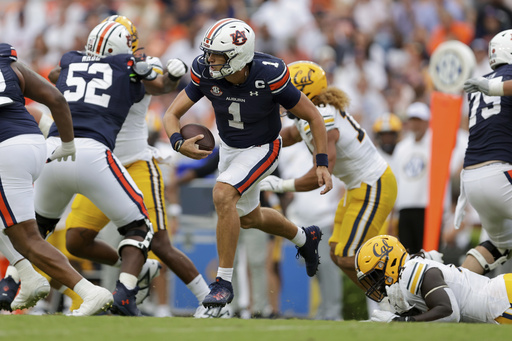TRENTON, N.J. — Following a surprising defeat where he was intercepted four times in September, Auburn quarterback Payton Thorne was confronted by disgruntled bettors blaming his lackluster performance for their financial losses. Some even reached out to him via the Venmo app, requesting refunds for their bets.
In March, North Carolina basketball player Armando Bacot reported receiving over 100 direct messages from frustrated gamblers due to his failure to achieve enough rebounds for their winning wagers.
In light of these incidents, New Jersey, the state that celebrated a significant Supreme Court win that spurred the growth of legal sports betting throughout the nation, is considering a prohibition on betting related to the individual statistics of college athletes.
Advocates in New Jersey contend that student-athletes, who share dining halls, dormitories, and classes with their peers, face a heightened risk of pressure and harassment compared to their professional counterparts.
“The legalization of sports betting has not yielded all positive outcomes,” stated state Senator Kristin Corrado.
A proposed bill being discussed in the state Legislature aims to outlaw proposition bets, often referred to as “props,” where wagers are placed on an athlete’s specific achievements during a game. These can encompass metrics such as the number of touchdowns a quarterback throws, the yardage a running back achieves, or the rebounds gathered by a basketball player.
According to Austin Mayo, an assistant director of government relations for the NCAA, approximately one in three student-athletes in heavily wagered sports has reported experiencing harassment from gamblers. The NCAA is advocating for a nationwide prohibition on these types of bets. Should the bill pass, New Jersey would join 13 other states that currently ban college prop bets, including Ohio, Maryland, Vermont, Louisiana, Arizona, Colorado, Massachusetts, Oregon, New York, Pennsylvania, Tennessee, Virginia, and West Virginia.
Nevertheless, Bill Pascrell III, a lobbyist representing various gambling and sports-betting organizations, argued that there is no clear evidence of significant harm arising from college prop bets, which he claims account for only 2% to 4% of the legal sports betting market.
“By outlawing any category of bets, especially those that have been sanctioned, we risk driving bettors toward the illegal market,” he explained.
While New Jersey permits betting on college games, it forbids wagering on teams from the state or on out-of-state teams playing within New Jersey.
Pascrell highlighted that the success of New Jersey colleges Seton Hall and St. Peter’s in recent tournaments stimulated wagers placed via illegal offshore sites or through legal avenues in other states where such betting is allowed.
The Assembly committee has already approved and released the bill, but it still requires endorsement from both legislative chambers and the signature of Governor Phil Murphy to become effective.
New Jersey’s legal battle to challenge a nationwide ban on sports betting, which previously applied to all but four states, culminated in a 2018 Supreme Court decision that now allows all states to participate—currently, 38 states have legalized it, with Missouri on track to become the 39th.


